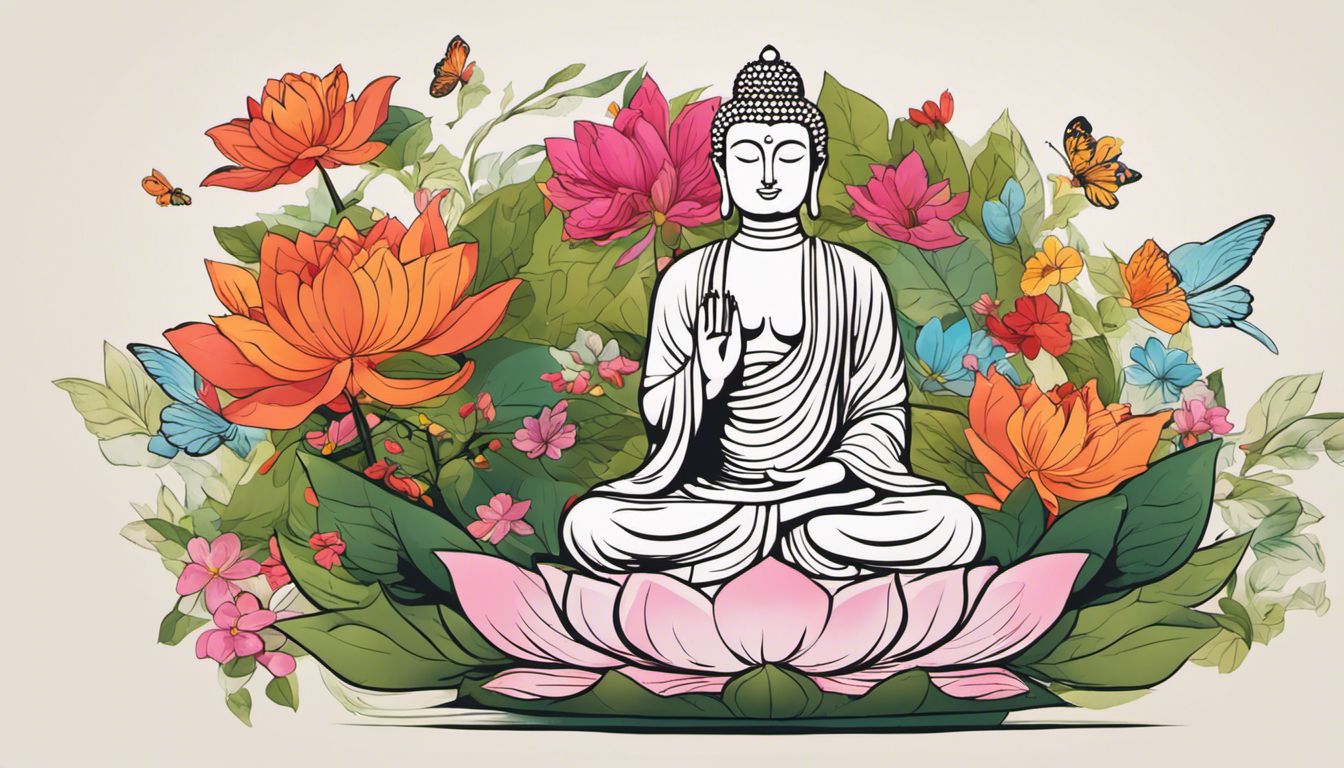
Mindfulness and self-awareness are related concepts, but there is a crucial distinction between the two. While mindfulness focuses on being aware of our current experience in the present moment, self-awareness is focused on understanding our thoughts, feelings, and behaviors, and how they affect our lives.
This article will help you understand the difference between these two concepts, how they can work together to promote personal growth, and how you can incorporate both into your daily life. Through exploring mindfulness and self-awareness, you will gain deeper insight into yourself and develop tools for leading a more fulfilling life.
Key Takeaways
- Mindfulness is about being fully aware of what’s happening in the present moment without judgment or attachment to thoughts and emotions.
- Self – awareness involves deep understanding of oneself, including thoughts, emotions, and actions.
- Mindfulness focuses on living in the present moment and accepting things as they are, while self-awareness encourages introspection and exploration of one’s thoughts and feelings.
- Both mindfulness and self-awareness promote personal growth, but they have different approaches – mindfulness promotes presence and centeredness, while self-awareness facilitates self-understanding and positive change.
What is Mindfulness?

Mindfulness is the practice of intentionally bringing one’s attention to the present moment, without judgment or attachment to thoughts and emotions.
Definition of Mindfulness
Mindfulness is being fully aware of what’s happening right now. It means you know your actions and the things around you. You don’t react to them in a rush. Instead, you stay calm and relaxed.
This way of thinking comes from Buddha’s wise path to end sadness and learn more about life. Practising mindfulness can make us feel better mentally because it teaches us to focus on purpose.
Characteristics
Mindfulness has unique traits that make it special.
Benefits (decreased stress and anxiety, adaptability, fulfillment, health and wellness, purpose)
There are many good things that come from being mindful. Here is a list of them:
- It lowers stress and anxiety: Mindfulness can help make us feel less worried. It keeps our brain healthy and helps us deal with tough times better.
- Better adaptability: Being mindful makes it easier for us to accept changes in life. We can handle new things without feeling stressed.
- More fulfillment: Mindfulness helps us enjoy every moment of life more fully. This can make us feel happier.
- Better health and wellness: Staying mindful keeps your body in a good state too. It has been linked to lower blood pressure, better sleep, and less pain.
- A sense of purpose: Mindfulness can give us a clear mind, which helps us understand what we really want from life.
What is Self-Awareness?
 Self-awareness refers to a deep understanding of oneself, including one’s thoughts, emotions, and actions.
Self-awareness refers to a deep understanding of oneself, including one’s thoughts, emotions, and actions.
Definition
Mindfulness is the ability to focus on what’s happening right now. It means paying mind to your thoughts and feelings in this moment, without thinking of the past or future. Self-awareness, on the other hand, lets us see how we think and feel about ourselves through deep thought and looking inward.
Being self-aware helps us understand our actions better. Both mindfulness and self-awareness are part of living a happy life. They help you grow as a person too!
Importance
Knowing yourself is vital. Being self-aware makes you manage your feelings better. This helps to limit the effects of these emotions on you and others around you. It gives a good grasp of why changes might be needed in your life too.
In short, self-awareness adds value by helping you understand yourself more deeply and react better to what’s happening around you.
Differences between Mindfulness and Self-Awareness
Mindfulness focuses inward, while self-awareness is more outward.
Focus (inward vs outward)
Mindfulness and self-awareness differ in focus. Mindfulness keeps our mind on the present. It helps us feel what is happening around us right now. Self-awareness also looks inward, but it digs deeper.
It urges us to think about our feelings and thoughts. We can then understand why we feel a certain way. Both skills help us live better lives but they do this in different ways.
Attitude (non-judgmental vs judgmental)
Mindfulness makes us stop judging. We see things as they are, not as we want them to be. This is a non-judgmental attitude. It helps us deal with stress and bad feelings better. On the other hand, self-awareness can sometimes lead to being judgmental.
We look at our thoughts and actions closely. Sometimes, this leads us to judge ourselves too harshly for wrong choices or mistakes made in the past.
Purpose (letting go vs uncovering)
The purpose of mindfulness is to let go. It’s about releasing fears, worries, and anxieties that may be holding us back. When we practice mindfulness, we focus on the present moment and let go of thoughts about the past or future.
We learn to observe our thoughts and emotions without judgment and simply allow them to come and go like clouds in the sky. Mindfulness teaches us to bring our attention back to the present moment whenever it wanders away.
On the other hand, self-awareness has a different purpose – uncovering. Self-awareness allows us to see ourselves more clearly, including our thoughts, feelings, and patterns of behavior.
It helps us gain a greater understanding of who we are at our core. With self-awareness, we can identify areas for growth and make positive changes in our lives. Instead of letting go of thoughts and emotions, self-awareness encourages us to explore them more deeply so that we can better understand ourselves and move through life with intentionality.
Similarities between Mindfulness and Awareness
Both mindfulness and awareness involve paying attention in the present moment, leading to personal growth and self-awareness. Interested to know more about how these practices can benefit your life? Keep reading!
Both involve paying attention in the present moment
Both mindfulness and self-awareness require us to focus on the present moment. When we practice mindfulness, we intentionally pay attention to our thoughts, feelings, bodily sensations, and the environment around us without judgment.
It’s about being fully present in the here and now. Self-awareness, on the other hand, involves bringing our attention and awareness to our own lives in general. It helps us understand ourselves better and become more attuned to our thoughts, emotions, values, strengths, weaknesses, and behaviors.
Both practices enable us to cultivate a greater understanding of ourselves and the world around us.
Both can lead to personal growth and self-awareness
Practicing both mindfulness and self-awareness can bring about personal growth and self-awareness. By being mindful, we develop the ability to focus on the present moment without judgment or criticism.
This helps us become more aware of our thoughts, emotions, and bodily sensations. On the other hand, self-awareness allows us to have a deeper understanding of ourselves – our strengths, weaknesses, values, and beliefs.
These practices complement each other and can lead to greater self-discovery and a clearer understanding of who we are.
How to Practice Mindfulness and Self-Awareness
To practice mindfulness and self-awareness, incorporate techniques such as awareness, acceptance, non-judgment, beginner’s mind, and gratitude. Incorporating yoga and meditation can also help cultivate a mindful and self-aware mindset.
Some individuals also find that natural supplements, such as Ashwagandha Extract in Capsules, can support their mindfulness and self-awareness journey by helping to reduce stress and promote a sense of calm alongside these practices.
Techniques (awareness, acceptance, non-judgment, beginner’s mind, gratitude)
Techniques for practicing mindfulness and self-awareness include:
- Awareness: Maintain a moment-to-moment awareness of your thoughts, emotions, and bodily sensations. Stay present and observe without judgment.
- Acceptance: Embrace and accept your experiences as they are, without trying to change them or judge them as good or bad.
- Non-judgment: Refrain from placing judgments on yourself or others. Let go of the need to categorize experiences as right or wrong.
- Beginner’s mind: Approach each moment with a fresh and open mindset, like a beginner discovering something for the first time.
- Gratitude: Express gratitude for the present moment and the experiences it brings.
Incorporating yoga and meditation
Yoga and meditation can be incorporated into daily life to enhance mindfulness and self-awareness. Here are some ways to do it:
- Start with a simple yoga routine: Begin your day with a few minutes of gentle stretching and breathing exercises. This can help calm the mind and prepare you for the day ahead.
- Practice mindful movement: During yoga, pay attention to how your body feels in each pose. Notice any sensations, tensions, or areas of tightness. Focus on staying present in the moment and connecting with your body.
- Use meditation techniques: Set aside a few minutes each day for meditation. Sit comfortably, close your eyes, and focus on your breath. Notice the sensation of each inhale and exhale, without judgment or attachment to thoughts.
- Cultivate gratitude: Take time each day to reflect on what you are grateful for. This can be done during yoga or meditation practice, or at any other quiet moment throughout the day. Expressing gratitude helps shift our focus towards positivity and appreciation.
- Stay consistent: Incorporating yoga and meditation into your daily routine is most effective when practiced regularly. Aim for consistency rather than perfection, starting with just a few minutes per day and gradually increasing as you feel comfortable.
Conclusion
In conclusion, mindfulness and self-awareness are two distinct concepts that have their own unique focuses and approaches. Mindfulness involves paying attention to the present moment without judgment, while self-awareness involves consciously tuning in to one’s thoughts, emotions, and actions.
Both practices are important for personal growth and well-being, with mindfulness promoting presence and centeredness, and self-awareness facilitating self-understanding and positive change.
By practicing both mindfulness and self-awareness, individuals can cultivate a deeper awareness of themselves and the world around them.
FAQs
1. What is the difference between mindfulness and awareness?
The main difference between mindfulness and awareness lies in their focus. Mindfulness refers to the practice of being alert, present, and fully engaged in the current moment while self-awareness involves understanding one’s own thoughts, emotions and actions.
2. How does mindful living help us improve ourselves?
Mindful living brings a sense of calm and stillness. It helps to reduce negative thoughts that make you feel stressed. This can lead to self-improvement by helping you stay less overly critical of yourself.
3. Can yoga be a way to practice mindfulness?
Yes, yoga can be a great way for exercising both mindfulness meditation as well as promoting your physical sensations making it an effective formality for mindful awareness development.
4. Why are “mindfulness” and “awareness” used interchangeably at times?
Often people use these words interchangeably because they are foundations of similar Buddhist meditation practices like Shamatha that promote introspection towards your natural state.
5. Does practicing mindfulness have any benefits?
Practicing mindfulness aids in identifying thought patterns enabling us to handle our emotions better which leads improved overall wellness.
6.What is meant when we say “you’re being mindful”?
When someone says “you’re being mindful”, it means you’re focusing on what’s happening now without judging or letting past or future events cloud your judgement.
###
Q: What is the difference between mindfulness and self-awareness?
A: Mindfulness is a state of being present and focusing on the current moment, while self-awareness involves understanding one’s thoughts, feelings, and behaviors.
###
Q: How can mindfulness increase self-awareness?
A: By practicing mindfulness, individuals can develop a greater understanding of their inner experiences, which in turn enhances their self-awareness.
###
Q: Can you explain the foundations of mindfulness?
A: The foundations of mindfulness refer to the basic principles and practices involved in cultivating mindful awareness, such as meditation and breathing exercises.
###
Q: What is the significance of mindful awareness in daily life?
A: Mindful awareness helps individuals stay focused, manage stress, and cultivate a greater sense of presence in their everyday experiences.
###
Q: How does mindfulness differ from self-improvement?
A: While self-improvement focuses on personal development and setting goals, mindfulness emphasizes being present and accepting one’s current state without judgment.
###
Q: What role does yoga practice play in enhancing mindfulness?
A: Yoga practice incorporates mindful movements and breath awareness, making it a beneficial tool for cultivating mindfulness and self-awareness.
###
Q: How can a meditation teacher help individuals with mindfulness and self-awareness?
A: A meditation teacher can provide guidance and support in developing mindfulness practices and self-awareness techniques through structured meditation sessions and personalized instruction.
###
Q: What should I know about the difference between awareness and mindfulness?
A: While awareness refers to the overall perception of one’s surroundings, mindfulness involves a focused awareness on the present moment and internal experiences.
###
Q: Why is it important to practice mindfulness in daily life?
A: Practicing mindfulness in daily life promotes emotional regulation, reduces stress, and fosters a deeper connection with oneself and the surrounding environment.
###
Q: What are the benefits of practicing mindfulness in relation to emotions and thoughts?
A: Practicing mindfulness can help individuals observe and manage their emotions and thoughts more effectively, leading to greater emotional resilience and mental clarity.
###
MindOwl Founder – My own struggles in life have led me to this path of understanding the human condition. I graduated with a bachelor’s degree in philosophy before completing a master’s degree in psychology at Regent’s University London. I then completed a postgraduate diploma in philosophical counselling before being trained in ACT (Acceptance and commitment therapy).
I’ve spent the last eight years studying the encounter of meditative practices with modern psychology.
